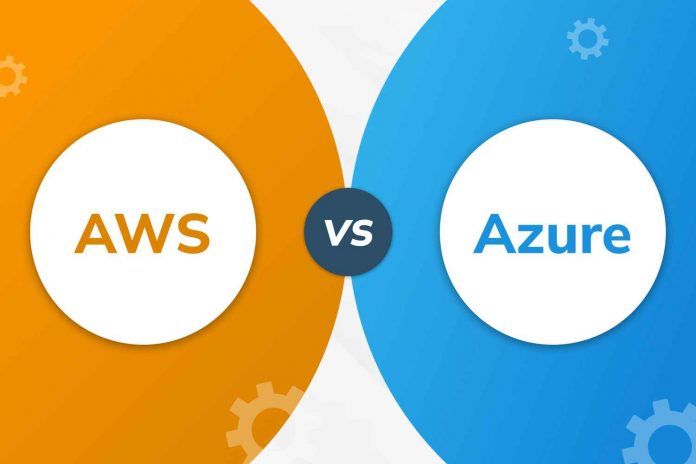
Cloud certifications from Amazon Web Services (AWS) and Microsoft Azure are critical assets for IT professionals seeking top career opportunities in 2025. Together, these two platforms power more than half of the global cloud market. AWS leads with a 30% share, while Azure follows with 20%, reflecting strong enterprise and government adoption. Both providers offer multi-level certification paths, with distinct benefits and industry relevance depending on your background and goals.
This article delivers an up-to-date, side-by-side comparison of AWS and Azure certifications, including certification levels, exam structure, pros and cons, and the latest salary insights. Discover which cloud credential aligns best with your career path as multi-cloud skills become increasingly valuable.
What Are AWS Certifications?
AWS certifications are industry-recognized credentials offered by Amazon Web Services that validate expertise in cloud computing technologies. These certifications demonstrate a professional’s ability to design, deploy, and manage applications and infrastructure on the AWS platform. Available across multiple skill levels and technical domains, AWS certifications cover roles such as cloud architects, developers, operations professionals, and specialized areas like security, machine learning, and data analytics. Earning an AWS certification helps professionals stand out in the competitive tech job market and confirms their capability to work effectively with one of the world’s leading cloud platforms.
Certification Levels
| Level | Key Certifications | Ideal Candidate Profile |
| Foundational | AWS Certified Cloud Practitioner | Beginners and business stakeholders learning AWS fundamentals |
| Associate | Solutions Architect, Developer, SysOps Administrator | Professionals handling core AWS operations and solution deployments |
| Professional | Solutions Architect, DevOps Engineer | Senior engineers designing complex, scalable cloud architectures |
| Specialty | Security, Machine Learning, Data Analytics, Networking | Experts seeking targeted technical depth in specific AWS domains |
AWS Exam Structure
- Format: Multiple-choice and scenario-based questions
- Duration: 90–180 minutes depending on the certification
- Validity: 3 years, after which recertification is required?
- Prerequisites: No prerequisites for Foundational; hands-on experience recommended for all levels
Pros:
- Broad global recognition and strong market value across industries?
- Extensive specialization options (over 12 certification paths)
- Competitive salaries for certified professionals.
Cons:
- Steep learning curve for those new to cloud or DevOps
- Higher costs at advanced levels
- Requires continuous skill updates due to rapid AWS ecosystem changes
What Are Azure Certifications?
Azure certifications validate technical expertise in Microsoft’s cloud platform, which holds a solid 20% share of the global cloud market in 2025. Enterprises and public sector organizations value these certifications for their alignment with hybrid cloud, strong integration with Microsoft 365, Dynamics 365, and enterprise IT environments. Whether entering cloud computing or seeking advanced specialization, Microsoft’s role-based certifications offer clear guidance for diverse career paths and skill enhancement within the Azure ecosystem.
Certification Levels
| Level | Key Certifications | Ideal Candidate Profile |
| Fundamentals | Azure Fundamentals (AZ-900), AI Fundamentals (AI-900), Data Fundamentals (DP-900) | Beginners and non-technical professionals learning basic cloud concepts |
| Associate | Azure Administrator (AZ-104), Developer (AZ-204), Security Engineer (AZ-500) | IT professionals managing or deploying Azure services |
| Expert | Solutions Architect (AZ-305), DevOps Engineer (AZ-400) | Senior professionals designing complex Azure solutions |
| Specialty | SAP Workloads, IoT Developer, Virtual Desktop | Advanced roles with niche specialization needs |
Azure Exam Structure
- Format: Multiple-choice and case-study-based questions
- Duration: 60–180 minutes depending on the exam
- Validity: Certifications remain active, but Microsoft recommends validation of skills annually
- Prerequisites: None for Fundamentals; hands-on experience typically required for Associate and Expert
Pros:
- Strong adoption across enterprises and government agencies (85% of Fortune 500 use Azure)
- Role-based, structured certification path simplifies progression
- Lower exam costs for all levels (compared to AWS)
- Hybrid cloud and AI credentials highly relevant for future-ready roles
Cons:
- Lower share of global market versus AWS limits some opportunities abroad
- Fewer certification paths compared to AWS
- Best suited for those already working in Microsoft environments
AWS vs Azure Certifications – Detailed Comparison
| Aspect | AWS Certification | Azure Certification |
| Market Share (Q2 2025) | 30% | 20% |
| Certification Levels | 4 tiers (Foundational, Associate, Professional, Specialty) | 3 tiers (Fundamentals, Associate, Expert) |
| Total Certification Paths | 12+ major certifications | 8 primary certifications |
| Entry-Level Exam Cost | $100 (Cloud Practitioner) | $99 (AZ-900 Fundamentals) |
| Mid-Level Exam Cost | $150 (Associate) | $165 (Associate/Expert) |
| Advanced-Level Exam Cost | $300 (Professional/Specialty) | $165 (Expert/Specialty) |
| Validity Period | 3 years (recertification required) | Active (annual validation recommended) |
| Salary (US avg., Solutions Architect) | $122K–$136K | $140K–$157K |
| Industry Strengths | Startups, SaaS, AI/ML, global reach | Enterprise IT, hybrid, government, MS stack |
| Job Market Demand | Global, very high | Enterprise, government, high |
Market Share and Global Reach
AWS is the leading cloud platform globally, trusted by startups, mid-sized companies, and large enterprises for its flexibility, scalability, and comprehensive service offerings. While other cloud providers like Microsoft Azure and Google Cloud also serve significant markets, AWS remains the platform of choice for organizations looking to build modern, cloud-native applications. Whether you’re working with a Fortune 500 company, a fast-growing startup, or a government agency, AWS certifications demonstrate your expertise on the most widely adopted cloud platform in the industry.
Certification Structure and Learning Paths
AWS offers a four-tier system spanning foundational, associate, professional, and specialty certifications. This structure supports diverse learning styles and allows IT professionals to specialize deeply in areas like Cloud Security, Machine Learning, and Advanced Networking. Azure uses a role-based, three-tier model, progressing from Fundamentals to Expert, with a clear path for those working in enterprise and hybrid IT environments. Both systems accommodate entry-level to advanced professionals, though AWS offers a broader selection of certifications overall.
Costs and Value
AWS entry-level exams cost $100, with advanced exams priced up to $300; Azure starts at $99 for Fundamentals and $165 for all associate, expert, and specialty certifications. While Azure generally presents lower exam fees, recertification and annual skill validation are recommended on both tracks. Investment in certification is offset by strong returns in employability and earning potential.
Salary and Job Demand
AWS-certified professionals continue to rank among the top earners in cloud technology. According to PayScale, individuals holding the AWS Certified Solutions Architect – Professional credential earn an average of $151,000 per year, with most salaries ranging from $105,000 to $200,000, depending on role and experience level.
| AWS Certified Solutions Architect (U.S.) | Salary Range (USD) | Average |
| Solutions Architect | $105,000 – $200,000 | $157,221 |
| Cloud Solutions Architect | $93,000 – $200,000 | $148,252 |
| Senior Solutions Architect | $129,000 – $196,000 | $163,441 |
| DevOps Engineer | $83,000 – $168,000 | $130,041 |
Professionals certified in Microsoft Azure also maintain strong earning potential across enterprise environments. PayScale data shows an average salary of $104,000 per year, with figures ranging between $55,000 and $161,000 across related roles.
| Microsoft Azure Professionals (U.S.) | Salary Range (USD) | Average |
| Systems Administrator | $55,000 – $100,000 | $73,113 |
| Software Engineer | $71,000 – $127,000 | $93,513 |
| Senior Software Engineer | $98,000 – $156,000 | $123,782 |
| DevOps Engineer | $72,000 – $148,000 | $103,889 |
Both AWS and Azure certifications continue to drive high demand in global markets. As organizations transition toward hybrid and multi-cloud infrastructures, certified professionals with cross-platform expertise are increasingly earning salary premiums and gaining faster career advancement opportunities.
Industry Fit & Specializations
AWS is ideal for cloud-native architectures, global multi-cloud deployments, startups, and sectors like SaaS and fintech. Azure remains the top choice in enterprise IT, public sector, and hybrid cloud implementations, particularly where organizations leverage Microsoft platforms and need extensive compliance or government integration.
Which Cloud Certification Should You Choose?
Choosing between AWS and Azure certifications depends largely on your career goals, technical background, and the industries or organizations you plan to work with. Both platforms offer excellent opportunities, but each has advantages for different profiles.
Choose AWS Certification If
- Global career flexibility: AWS is preferred for cloud-native, startup, and international roles due to its broad service portfolio and market dominance.
- In-depth specialization: AWS offers more certification paths, ideal for professionals aiming for advanced roles in DevOps, AI/ML, or cloud security.
- High-demand regions: AWS skills are widely sought in North America, Europe, and major tech hubs across industries, including SaaS and digital enterprises.
- Technical background advantage: Ideal if you already have or plan to build experience in Linux, DevOps, or multi-cloud environments.
Choose Azure Certification If
- Enterprise and government focus: Azure excels in Fortune 500 companies, public sector organizations, and businesses operating on Microsoft platforms.
- Structured, role-based learning path: Azure’s tiered certification system supports steady growth from administrative to architectural roles.
- Microsoft ecosystem alignment: Best suited for professionals with experience in Windows Server, Office 365, Active Directory, or Power Platform.
- Hybrid cloud and compliance expertise: Perfect for those interested in hybrid cloud integration, compliance management, and Microsoft’s expanding AI and data services.
The Multi-Cloud Advantage
Multi-cloud expertise is rising fast, with most large organizations combining AWS, Azure, and other providers. Professionals certified in both platforms enjoy enhanced job mobility, salary potential, and resilience against market shifts. Consider starting with the platform aligned to your current role or company technology stack, then expand to a second platform for added versatility.
Decision Matrix
| Profile | Recommended Certification Path |
| Complete beginner | AWS Cloud Practitioner or Azure Fundamentals (AZ-900) |
| Microsoft ecosystem professional | Azure Administrator (AZ-104) |
| Developer or Linux background | AWS Developer Associate or Azure Developer (AZ-204) |
| Enterprise IT administrator | Azure Admin/Architect |
| Aiming for global career or startup | AWS Solutions Architect |
| Security, AI, or Data specialist | AWS Specialty or Azure Specialty |
Future Trends: AWS vs Azure in 2025
AI and Automation Lead Certification Value
Both AWS and Azure are rapidly integrating artificial intelligence services into their platforms. GenAI-driven cloud offerings saw growth rates of 140–180% in 2025, and new certifications around AI, machine learning, and prompt engineering are appearing. Professionals with AI and data specialization, especially through.
Multi-Cloud and Hybrid Adoption Are Now Mainstream
As of now, 92% of enterprises operate in multi-cloud environments, making dual certifications more valuable than ever. AWS excels at multi-region global deployments, while Azure remains the leader for hybrid architectures connecting on-premises to cloud, both platforms increasingly expect cross-platform knowledge for senior roles.
Security and Compliance Certifications Rise
Cloud-related cybersecurity threats continue to increase, leading to strong growth in demand for AWS Certified Security – Specialty and Microsoft’s Cybersecurity Architect Expert certifications. Security-focused roles now rank among the fastest-growing and best-compensated in the IT industry.
Green Cloud and Sustainability
Sustainability is becoming a differentiator for clients and employers. AWS has achieved 100% renewable energy, and Azure has committed to becoming carbon-negative by 2030. Organizations now seek professionals who can help optimize workloads for energy efficiency and compliance, signaling future certification opportunities in sustainable cloud operations.
Talent and Salaries Continue to Grow
Gartner forecasts public cloud spending will reach $723 billion in 2025, and cloud job growth will remain above 21.5% per year. Professionals earning both AWS and Azure certifications position themselves for high mobility, global opportunities, and top salaries, especially in AI, security, and hybrid-cloud specializations.
Conclusion
Selecting the right cloud certification in 2026 is a strategic investment in your technology career. AWS and Azure certifications each offer strong job prospects and industry recognition, but the optimal choice depends on your desired platform ecosystem, role specialization, and target employers.
With AWS certifications leading in startups and global cloud-native roles, and Azure certifications dominating enterprise IT and hybrid environments, aligning your learning path to market trends increases ROI. Multi-cloud expertise is a rising standard, and professionals certified in both AWS and Azure report higher mobility and salary growth. Whether you start with AWS or Azure, staying current and gaining hands-on experience is key to maximizing the value of your cloud certification and long-term career success.
Frequently Asked Questions
1. What is the difference between AWS and Azure certification exam formats?
AWS exams emphasize scenario-based, multiple-choice questions that test practical problem-solving, while Azure exams often incorporate lab-based tasks in addition to theoretical questions, measuring your ability to apply knowledge hands-on.
2. Do companies prefer multi-cloud certification over expertise in a single cloud platform?
Increasingly, yes. Employers value professionals comfortable with both AWS and Azure, since hybrid and multi-cloud deployments have become standard for reducing risk and optimizing costs in enterprise IT landscapes.
3. Which industries favor Azure certifications compared to AWS credentials?
Azure certifications are especially sought in large enterprises, finance, government, healthcare, and organizations already using Microsoft applications like Office 365 or Dynamics. AWS is favored in startups, global SaaS companies, and infrastructure automation roles.
4. Is the learning curve significantly different between AWS and Azure certifications?
AWS generally requires deeper understanding of cloud-native concepts and service breadth, which can be challenging for beginners. Azure’s certification paths are often considered more accessible, especially for those with a Microsoft background.
5. Are there any risks in choosing the “wrong” certification for your career goals?
Focusing on a certification misaligned with your region’s job market or your target employers can limit career progress. For example, AWS remains dominant in the U.S. tech sector, while Azure is often preferred in enterprise and government roles in Europe and Asia.














